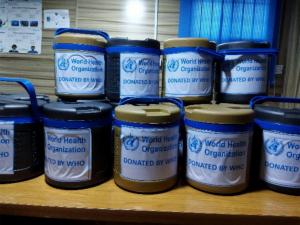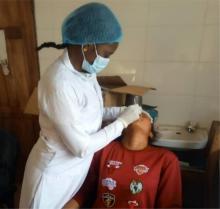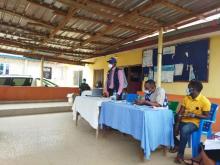Improving testing rate -WHO supports Ondo State to integrate COVID-19 sample collection as part of essential services.
Akure, 26 July, 2021 - The World Health Organization (WHO) has supported Ondo State to integrate COVID-19 sample collection into the essential health care services. The intervention has led to an increase in the number of samples tested from an average of 70 to 321 per week, since the integration.
The intervention was informed following a decline in most of the COVID-19 monitoring indices in the state. The number of samples tested decreased from 1080 in epidemiological week 05 (01-07 February 2021) to 225 samples in week 11 (15 -21 March), 2021. Also, the case to contact ratio during this period remained consistently low at 1:1, and 69% (73/105) of the active cases were under home-based care (HBC) in week 11 (15-21 March), 2021.
With this situation, the State Ministry of Health (SMoH) approached WHO for support to implement activities to address the challenges. The objective was to scale up testing by expanding sample collection sites in the three hotspots LGAs of Akure South, Akure North, and Owo. Additionally, efforts were to improve monitoring of COVID-19 patients under Home Based Care (HBC), improve contact tracing for all positive cases and strengthen coordination through revitalization of weekly coordination meetings in the 3 priority LGAs and at State level.
With this in mind, WHO supported the state in the decentralization and integration of COVID-19 sample collections into the essential health care system.
This involved identification and training of 103 laboratorians/sample collectors (1 per health facility) across the three LGAs. These health facility staff, based within the facilities were trained on how to conduct daily screening, triaging and collection of samples from all identified suspected cases that either visited or were referred to the health facility.
WHO equally supported monitoring of HBC and contact tracing through training of members of the Nigeria Red Cross Society residing across all wards on HBC monitoring and contact tracing. Selected LGAs and state level teams were supported to conduct supportive supervision at the LGA and health facility level to ascertain the status of the response activities.
Due to the inadequate availability of giostyles at the facilities, except for those in use for immunization, temporary sample storage coolers were procured to ensure proper storage of collected samples before collation and transport to the laboratory.
To underscore the significance of the strategy, State Epidemiologist, Dr Stephen Fagbemi said that, “People at the local government level have capacity to response to the outbreak and there was no justification to over centralize the response.
With the intervention at the local government level, more COVID-19 cases have been detected as we have taken testing closer to the people… we commend this initiative as it is something that needs to be sustained and scaled up so we can find out what is happening in other LGAs,” he said
Preliminary results
Preliminary results show that, three weeks prior to the commencement of the intervention (03-23 March, 2021) an average of 70 samples were collected weekly across the state out of which an average of 12 cases were confirmed. During the period of the intervention, the number of weekly samples collected and tested in the State increased to an average of 321 samples weekly
In the three hotspot LGAs, the cumulative sample collection increased from 133 samples three weeks prior to commencement to a total of 808 (Akure South-336, Akure N-228, Owo-244) samples collected three weeks post commencement of WHO support
The WHO State Coordinator, Dr. Akinola Fatiregun, at a stakeholder’s meeting said, ‘Prior to the intervention, only two sample collection sites were functional. Currently, there are 103 active sample collection sites located across the health facilities, public and private, in the three LGAs being supported.
The support by WHO has fostered integration, has strengthened the Covid-19 response at the ward level, and upon completion may be a template that is replicable in other areas and for other outbreaks.
WHO continues to provide data support for weekly EOC meetings at the state level and in the three hotspot LGAs
At a post intervention meeting to review impact of the intervention, the Permanent Secretary Ondo State Primary Health Care Development Agency, Dr. Francis Akanbiemu, said, “We find this support very useful and important in addressing COVID-19 and hopefully, we’ll eventually bring the pandemic to zero level… we’re happy and grateful for WHO’s timely intervention and we hope that it can be extended to the other 15 LGAs.”
However, support is required to strengthen risk communication and community engagement, support Infection Prevention and Control among frontline workers, strengthen surveillance at points of entry and support integration of Covid-19 response activities in the other 15 LGAs in the state.
Ondo State recorded its first confirmed case of COVID-19 on 3rd April 2020. Since then, the state has documented a total of 3500 confirmed cases including 65 deaths as of 19 July 2021 in two waves of the pandemic.
Technical Contacts:
Mr Namara Geoffery, Email: namarag [at] who.int; Tel: +234 703 178 1773
Dr Fatiregun, Akinola AyoolaEmail: fatireguna [at] who.int; Tel: +234 803 3720 966


